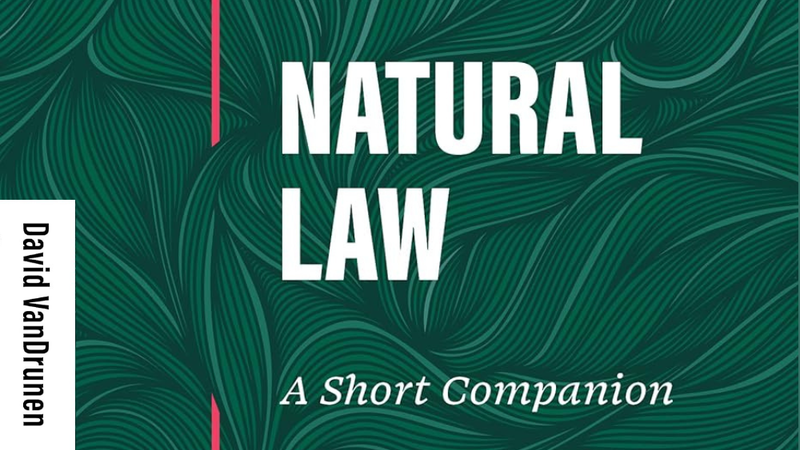"Natural Law: A Short Companion," by David VanDrunen
editors C. Ben Mitchell & Jason Thacker
B&H Academic | 2023 | 160 pages (Softcover) | $19.99
Let’s face it, when most readers see a series entitled “Essentials in Christian Ethics,” they will be prone to walk away. It sounds too abstract and obscure. When they see that this particular volume is on the topic of “Natural Law,” they will likely be compelled to run.
Please stop and turn around, dear readers! This short book by David VanDrunen is a gift to the church. With remarkable warmth and clarity, VanDrunen provides sorely needed wisdom for the Christian life.
In order to understand the importance of this book, you must understand the importance of natural law for you as a Christian. “Natural law,” according to VanDrunen, “refers to the law of God made known in the created order, which all human beings know through their physical senses, intellect, and conscience, although they sinfully resist this knowledge to various degrees” (1).
I know that’s a mouthful, but this concept is really important for virtually every part of our lives in Christ. “The nonexistence of natural law would throw Christian claims about God, the gospel, and the moral life into disarray” (Ibid.). It is the natural law that is written upon each of our hearts that testifies to what God requires of all mankind and leaves us without excuse (Rom. 1–2).
And because God’s natural law is written upon the heart of every human created in the image of God, we still see wisdom and goodness and compassion woven throughout the tapestry of this threadbare creation and the human race. It is also natural law that enables us to reason with our unbelieving friends. The truth is, they know the truth—but they suppress the truth in unrighteousness. This knowledge is not salvific, but it enables most of us to agree that genocide is not a human good.
As one who once learned under VanDrunen, I have a vast appreciation for his lawyerly lucidity (owing to his prior profession). He spends much of the first chapter defining his terms and correcting misinterpretations of the concept. In particular, he corrects the misimpression that natural law is a Roman Catholic concept and shows its broader adherence through church history.
The second chapter is worth the price of the book. VanDrunen shows how natural law creates the conditions for “a meaningful and purposeful world.” And in a masterstroke that reminds me of Cornelius VanTil, he highlights the contradiction of a culture that denies meaning but still searches for it—they are “still looking for meaning in their lives and feel despair when they lack it” (19).
He also highlights what this means for our identities (a buzzword in contemporary circles). As everyone tries to create new identities for themselves, VanDrunen reminds us that “The image of God is who we are. And to be God’s image means to have a moral calling in this world. Thus, who we are and what we are called to do are inseparable” (23).
As an aside, I do “identity briefs” for my soldiers rather than the more common “resiliency briefs” for this very reason. God “has given meaning to our existence. What we ought to do is wrapped up in what we are” (25).
VanDrunen particularly hits his stride by taking up John Barton’s term “cosmic nonsense” (34). “It is not just that sin is wrong; it is bizarre… Rebelling against reality is, quite literally, worse than asinine” (35). There is so much here that is useful for our interactions with unbelieving friends (as VanDrunen later addresses). It is not Christians who are at a loss to explain reality, but those who beclown themselves pursuing fantasies that are out of touch with reality.
In each of these chapters, VanDrunen lays out helpful passages from Scripture that contribute to the broader theme. In chapter three—on “natural law and civil justice”—he cites several biblical examples, such as Abraham and Abimelech, to show that throughout the unbelieving world, there are those who have a “fear of God” and understand that there are “things that ought not to be done” (44).
This was the general appeal of the Trial at Nuremburg, in which much of the world agreed that certain Nazis had committed crimes that deserved death. This is why those who suffer injustice feel aggrieved. “Some believers and unbelievers alike observe these boundaries, and some believers and unbelievers alike transgress them. But all victims are rightly outraged” (46).
In the fourth chapter, VanDrunen highlights a key usage of the natural law—to drive us to Christ. Romans 1–2 can make for really hard reading. We see the insatiable quest of God’s image bearers to suppress the truth in unrighteousness and how we engage in the “cosmic nonsense” of worshipping the creature, rather than the Creator.
“But just when Paul has taken readers to this low point, he begins the next section of Romans with two of the best little words ever written: ‘But now…’ (3:21)” (74). Paul proceeds to pour the warm tonic of the good news down our throats, declaring the triumph of the law-keeping, sin-bearing, life-producing Savior of mankind, Jesus Christ.
VanDrunen turns to the Christian life in chapter five and provides a thoughtful tour through the hallowed halls of Proverbs, showing us how the writer draws upon natural law insights to provide wisdom to the believer’s heart. “If we are to comprehend how evil our sin is and be fully motivated to avoid it, we need to see it as utterly stupid as well as a violation of God’s rules” (86). True to the book from which he exposits, VanDrunen offers so much practical wisdom that I found myself saying “I really need to go back and read Proverbs!”
The final chapter—on engaging the public square—will surely prove the most controversial. This is also the strongest chapter of the book. First, it feels like VanDrunen takes a slight detour in examining how we acquire wisdom through the natural law, but this provides some of the most sure guidance for Christian growth in this whole book (see pp. 102–108).
He then engages the public square and trains the cannons: “…there is more to Christians’ interaction with their unbelieving neighbors than just evangelizing them. Since we share neighborhoods, workplaces, governments, and much with them, we have a keen interest in how peacefully they live, how well they work and how they evaluate what is just” (109).
As one who grew up in the Religious Right, I am grateful for this burden-lifting insight. We always had a Bible verse for every cultural issue, leaving our unbelieving friends thinking that only Christians could think the way we did on such issues. I still have soldiers who believe that people are only pro-life for “religious reasons.” It also reminds us that we can have conversations about things other than the gospel and still be faithful to our calling in Christ.
VanDrunen reminds us that “the point of engaging unbelievers in the public square is not to bolster our spiritual self-esteem but to advance what is good and just in society” (110). And he is a happy warrior in how we engage, for “Christians have a stronger hand than they may think. They have reality on their side” (112). Amen.
I really think that—as with many debates among Christians in contemporary society—the resistance to VanDrunen’s take on natural law is not fundamentally biblical or theological, but cultural. Does his conception of natural law provide a sufficient basis for how we approach unbelievers and culture and what we expect of them in turn?
I personally find this conception of natural law to not only be consistent with Scripture, but the most natural basis for apologetics—especially in a “post-Christian” culture. Natural law is not an end unto itself. It celebrates the residue of truth that still permeates this world. It also exposes the fallacy of unbelieving thought, which suppresses the truth in unrighteousness.
We use natural law to not only pursue more just societies in God’s common grace, but with it, we can follow J. Gresham Machen’s endeavor to remove obstacles to the gospel. Out of love, let us take from our unbelieving friends the little ground they thought they could stand upon—and then let’s offer the strong and sure foundation of Jesus Christ.







